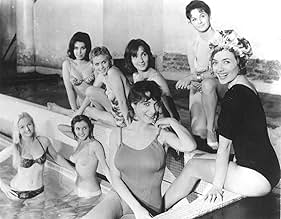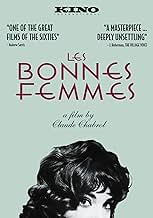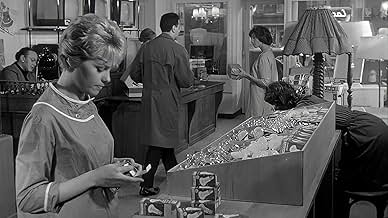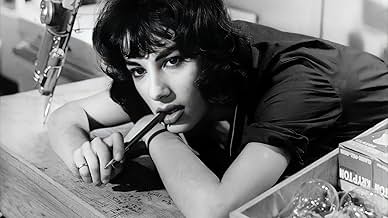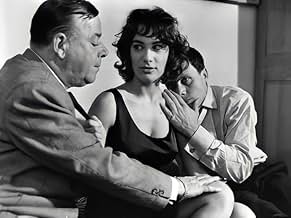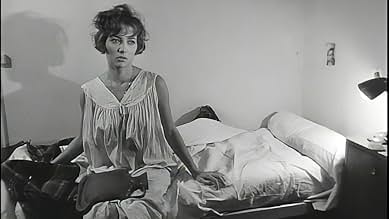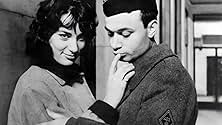AVALIAÇÃO DA IMDb
7,2/10
3,4 mil
SUA AVALIAÇÃO
Quatro mulheres parisienses navegam pelo mundo do romance e da vida cotidiana em busca da realização de seus sonhos, mas muitas vezes encontram a vida real como algo inevitável.Quatro mulheres parisienses navegam pelo mundo do romance e da vida cotidiana em busca da realização de seus sonhos, mas muitas vezes encontram a vida real como algo inevitável.Quatro mulheres parisienses navegam pelo mundo do romance e da vida cotidiana em busca da realização de seus sonhos, mas muitas vezes encontram a vida real como algo inevitável.
- Direção
- Roteiristas
- Artistas
- Prêmios
- 1 indicação no total
Gabriel Gobin
- Le père d'Henri
- (as Gabriel Gobain)
- Direção
- Roteiristas
- Elenco e equipe completos
- Produção, bilheteria e muito mais no IMDbPro
Avaliações em destaque
A friend of mine - a film scholar - once said that this film shouldn't work but it does. He was absolutely right. I cannot think of one good reason why this film should be as good as it is. The tone is observational, like many films of the "New Wave," but it lacks the frenetic energy of Godard, or the jaded lyricism of Truffaut. The tone of the film changes drastically at several points, and in any other film this would become a big turn off. But a strand of sincere honesty about the characters and their emotions holds the film together, stronger than any formality.
Let the film take you where it wants you to go, and the experience is wonderful.
Let the film take you where it wants you to go, and the experience is wonderful.
The film shows a weekend in the lives of four Parisian shop girls, from their Friday night out in the nightclubs of Paris through to a Sunday outing into the countryside. All four dream of escaping their humdrum existence: Ginette (Stephane Audran) is trying to start an alternative career as a music hall singer, Rita (Lucile Saint-Simon) is engaged to a shop owner, Jane (Bernadette Lafont) is wined and dined by two married businessmen, and Jacqueline (Clothilde Joano) falls in love with a biker who is stalking her. The monotony of the girls' lives is shown as they spend Saturday in the shop just waiting for the moment when they can go home. At the same time Chabrol shows a fascinating portrait of the city at work and at play. The storyline holds the viewer's interest, the acting is excellent (especially Lafont, and despite some terrible overacting from the girl's boss), and the director hints at some of the gruesome shocks of his later films.
10Aw-komon
The 'overacting of the boss' mentioned in the previous comment is totally intentional! Chabrol is playing around with genres here, exaggerating for effect. He straddles the fence between comedy and tragedy for the entire film, veering this way and that whenever it serves his purpose: to paint an allegory of absurd modern existence through the soul of modern young females. The surreal modern music at the beginning clues you in, and the awesome final scene with the empty, tragic eyes of the girl finding her only happiness when a man asks her to dance brings it all together beautifully. Man! what a great film! I didn't want to leave the theater after watching it twice in a row, but I was too tired. As disappointing as Chabrol's films have been to me over the years, this one was a jackhammer of a surprise. The Hitchcock elements are there but they don't dominate and straitjacket everything else. On a level with "Breathless," "Shoot the Piano Player," yet completely unlike either of them, this film defines the "New Wave" aesthetic, which to this day, some forty years later provides a standard for Tarantino types to strive for. Films like these can only be directed by masters who have the nerve and audacity to bend genres to their whim and speak their ultimate truth through the nature of the medium itself.
In Paris, Jane (Bernadette Lafont) and her colleague and roommate Jacqueline (Clotilde Joano) are walking home when the friends Marcel (Jean-Louis Maury) and Albert (Albert Dinan) hit on them and invited them to go to a restaurant. Later, Jacqueline goes home while Jane goes to Albert's apartment and has a threesome. On the next morning, they go to the appliance store Maison Belin where they work with Ginette (Stéphane Audran), Rita (Lucile Saint-Simon) and the spinster Mme Louise (Ave Ninchi), who is the cashier. The owner Monsieur Belin (Pierre Bertin) is an abusive boss, and they hate their work. Jane has a boyfriend but is a promiscuous party girl. Ginette has a secret life at night, singing in a music hall. Rita has a bourgeois fiancé, Henri (Sacha Briquet), who does not respect her and believes she is empty. Jacqueline is naive and believes in love, and when a biker follows her everywhere with his motorcycle, she believes he is her shy prince charming. When Jacqueline meets him at a public swimming pool, they introduce themselves to each other and the biker Ernest Lapierre (Mario David) dates her. They go to a remote restaurant in the countryside, and he asks her why she dated him without knowing him. But soon Jacqueline learns who he is.
"Les bonnes femmes" (1960), a.k.a. "The Good Time Girls", is the fourth film by Claude Chabrol disclosing the dull life of four young working-class women in the job at an appliance store. Their moments of joy are after hours, each one with a lifestyle. Jane is a promiscuous woman; Rita does not have self-respect; Ginette likes to sing in a music hall; and Jacqueline, who seems to be the youngest, is a dreamer. In common, they are treated like objects. It is funny to see how silly some men like Marcel and Albert were in those years in Paris. The conclusion is a great surprise from Chabrol. My vote is seven.
Title (Brazil): "Mulheres Fáceis" ("Easy Women")
"Les bonnes femmes" (1960), a.k.a. "The Good Time Girls", is the fourth film by Claude Chabrol disclosing the dull life of four young working-class women in the job at an appliance store. Their moments of joy are after hours, each one with a lifestyle. Jane is a promiscuous woman; Rita does not have self-respect; Ginette likes to sing in a music hall; and Jacqueline, who seems to be the youngest, is a dreamer. In common, they are treated like objects. It is funny to see how silly some men like Marcel and Albert were in those years in Paris. The conclusion is a great surprise from Chabrol. My vote is seven.
Title (Brazil): "Mulheres Fáceis" ("Easy Women")
Claude Chabrol made a film before Les bonnes femmes, Les Cousins, which is what made him known as part of the French New Wave (he preceded Truffaut and Godard by a year). But viewing Les bonnes femmes before seeing Les Cousins, I almost feel like this is a director's first film, for a director like Chabrol, as it shows a lot of his concerns as a filmmaker: an observational stance with women, their sexuality and their distance from the opposite sex, the mundane in a bourgeois life, and the Hitchcock angle of danger and the unknown. It's also in line with the other Nouvelle Vague films in the sense that the filmmaker has broken out of any ties to a studio or sets, and everything is out in the streets or on location in places like nightclubs and music halls and swimming pools, and usually with hand-held cameras and (seeming) improvisation with the actors. This is a gritty, on-the-streets Chabrol one isn't used to from seeing films like This Man Must Die and The Butcher.
And yet I don't know if I can say it's as great as the big early films of the period like The 400 Blows and Breathless. Chabrol's film does carry, I'm sure, some personal weight. And he's interested in these girls, their casual life and goings-on, and how so easily one of them can be lured by a mysterious man in a mustache who follows them around in a motorcycle. But it's such a loosely structured film- barely a plot, even less, if you can imagine, than Breathless- that it takes a moment for us to realize something is going on. Which perhaps is part of Chabrol's angle here: like Fellini's film I Vitelloni, we're just watching these four girls in their everyday occurrences, going to a zoo, going to a nightclub and hooking up with two (obnoxious) strangers, going to a music gall where one of the girls is secretly singing and doesn't want to go on for fear of embarrassment of the others seeing her, and just walking around. Or, as well, the complacency of working at a TV store where no one comes in.
We are drawn in to these girls and who they are, however limited they're really shown as full characters (more-so Chabrol is interested, I think, in these girls as 'types' possibly, or in looking at them in a semi-documentary perspective). And metaphor is used from time to time; I'm sure the visit to the zoo, and Chabrol's carefully timed and composed reaction shots of the animals in the cages, is deliberate as to the girls' own self-prison of 20-something frivolity. And there's also the matter, again, of the motorcycle guy, who somehow charms this girl. Actually not somehow, as in this sort of Nouvelle Vague film-world it's precisely the kind of guy a girl would fall for, even one seemingly so uptight as the one he goes after. Seeing how this plays out between them can go one of two ways, and how Chabrol shows it in the last fifteen minutes is totally masterful. There's a sense of the inevitable, but he keeps us uncertain as an audience, which is good. I'm glad I couldn't quite see where the ending would go, though when it came it made sense and was satisfying (it even raised up the worth of the film overall a full notch).
But a masterpiece? Probably not. It's like a breezy fling through a Parisian quarter, on the dark streets and cool nights with beautiful girls and not-so-beautiful but flirty men, and it has some wonderful moments. It just doesn't add up completely into something that makes you want to shake your friend up and say "You MUST watch this!" like 400 Blows, or even The Butcher.
And yet I don't know if I can say it's as great as the big early films of the period like The 400 Blows and Breathless. Chabrol's film does carry, I'm sure, some personal weight. And he's interested in these girls, their casual life and goings-on, and how so easily one of them can be lured by a mysterious man in a mustache who follows them around in a motorcycle. But it's such a loosely structured film- barely a plot, even less, if you can imagine, than Breathless- that it takes a moment for us to realize something is going on. Which perhaps is part of Chabrol's angle here: like Fellini's film I Vitelloni, we're just watching these four girls in their everyday occurrences, going to a zoo, going to a nightclub and hooking up with two (obnoxious) strangers, going to a music gall where one of the girls is secretly singing and doesn't want to go on for fear of embarrassment of the others seeing her, and just walking around. Or, as well, the complacency of working at a TV store where no one comes in.
We are drawn in to these girls and who they are, however limited they're really shown as full characters (more-so Chabrol is interested, I think, in these girls as 'types' possibly, or in looking at them in a semi-documentary perspective). And metaphor is used from time to time; I'm sure the visit to the zoo, and Chabrol's carefully timed and composed reaction shots of the animals in the cages, is deliberate as to the girls' own self-prison of 20-something frivolity. And there's also the matter, again, of the motorcycle guy, who somehow charms this girl. Actually not somehow, as in this sort of Nouvelle Vague film-world it's precisely the kind of guy a girl would fall for, even one seemingly so uptight as the one he goes after. Seeing how this plays out between them can go one of two ways, and how Chabrol shows it in the last fifteen minutes is totally masterful. There's a sense of the inevitable, but he keeps us uncertain as an audience, which is good. I'm glad I couldn't quite see where the ending would go, though when it came it made sense and was satisfying (it even raised up the worth of the film overall a full notch).
But a masterpiece? Probably not. It's like a breezy fling through a Parisian quarter, on the dark streets and cool nights with beautiful girls and not-so-beautiful but flirty men, and it has some wonderful moments. It just doesn't add up completely into something that makes you want to shake your friend up and say "You MUST watch this!" like 400 Blows, or even The Butcher.
Você sabia?
- CuriosidadesCaused so much resentment among the public upon its release that some went as far as breaking seats in theaters as sign of protest.
- Erros de gravaçãoAfter Ernest strangles Jacqueline, he rips his coat out from under her and flips her over. The supposedly dead Jacqueline immediately moves her arm to catch herself from going face first into the mud.
- Citações
Monsieur Belin: My pleasure in life is to reprimand little girls... It's my prerogative.
- ConexõesFeatured in Le fils de Gascogne (1995)
Principais escolhas
Faça login para avaliar e ver a lista de recomendações personalizadas
- How long is The Good Girls?Fornecido pela Alexa
Detalhes
Bilheteria
- Faturamento bruto nos EUA e Canadá
- US$ 6.578
- Fim de semana de estreia nos EUA e Canadá
- US$ 6.578
- 15 de ago. de 1999
- Tempo de duração
- 1 h 40 min(100 min)
- Cor
- Proporção
- 1.66 : 1
Contribua para esta página
Sugerir uma alteração ou adicionar conteúdo ausente

